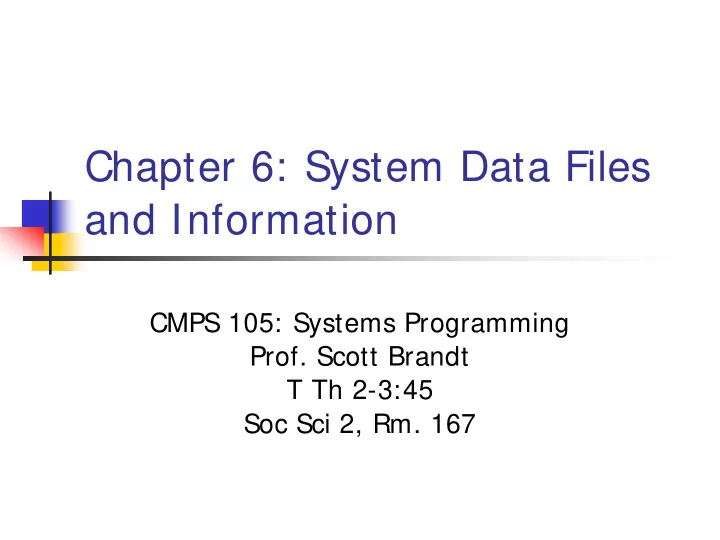

Chapter 6: System Data Files and Information CMPS 105: Systems Programming Prof. Scott Brandt T Th 2-3:45 Soc Sci 2, Rm. 167
Introduction � Lots of system parameters, configuration information, and status information is stored in files � Usually ASCII text files � Why? � Why are some things compiled in and others in config files?
Password File � User name: char * pw_name; � Encrypted password: char * pw_passwd; � Numerical user ID: uid_t pw_uid; � Numerical group ID: gid_t pw_gid; � Comment field: char * pw_gecos; � Initial working directory: char * pw_dir; � Initial shell: char * pw_shell;
Details � Usually an entry with username root � One-way password encryption � 13 characters (from 64 character set) � Fields can be empty � Some unixes support other fields � root:jheVopR58x9Fx:The superuser:/:/bin/sh
Accessing the password file � # include < sys/types.h> � # include < pwd.h> � struct passwd * getpwuid(uid_t uid); � maps uid (from file i-node) to password entry � struct passwd * getpwnam(const char * name); � maps username (from login) to password entry
Searching the password file � # include < sys/types.h> � # include < pwd.h> � struct passwd * getpwent(void); � Return the next entry in the password file � void setpwent(void); � Rewind password file to the beginning � void endpwent(void); � Close the password file � Note no corresponding open: getpwent() does that for us
Shadow Passwords � Hackers can guess lots of passwords, encrypt them, and compare them to password file entries � If there is a match, they know the password � Note: do NOT try this at home � Some systems avoid this by storing the encrypted passwords in a shadow file � Sometimes also employ password aging � Other password questions?
Group File � Group name: char * gr_name; � Encrypted password: char * gr_passwd; � Not part of POSIX � Numerical group ID: gr_gid; � Array of pointers to individual user names: char * * gr_mem;
Accessing Group File � # include < sys/types.h> � # include < grp.h> � struct group * getgrgid(gid_t gid); � struct group * getgrnam(const char * name); � struct group * getgrent(void); � void setgrent(void); � void endgrent(void); � Parallel the passwd functions
Supplementary Group IDs � Used to have to use newgrp() to change groups � Now, all group IDs are checked upon any access � # include < sys/types.h> � # include < unistd.h> � int getgroups(int gidsetsize, gid_t grouplist[]); � Gets list of groups for current user � int setgroups(int ngroups, const gid_t grouplist[]); � Sets list of groups for current user � int initgroups(const char * username, gid_t basegid); � Reads group file and then calls setgroups() for a user � Used by login
Other data files � Some systems support similar files for other purposes � /etc/hosts � /etc/services � /etc/protocols � /etc/networks � All support get, set, end, similar to passwd and group files
Login Accounting � Two data files: utmp and wtmp � utmp tracks all users currently logged in � wtmp keeps track of all logins and logouts � Let’s check them out
System identification � # include < sys/utsname.h> � int uname(struct utsname * name); � struct utsname { � char sysname[9]; // OS � char nodename[9]; // Host � char release[9]; // OS Release � char version[9]; // OS Version � char machine[9]; // Machine (hw) � } ; � Some systems: int gethostname(char * name, int namelen);
Time and Date Routines � Basic time services counts seconds since the Epoch � # include < time.h> � See figure on page 156 � time_t time(time_t * calptr); � struct tm * gmtime(const time_t * calptr); � struct tm * localtime(const time_t * calptr); � time_t mktime(struct tm * tmptr); � char * asctime(const struct tm * tmptr); � char * ctime(const time_t * calptr); � size_t strftime(char * buf, size_t maxsize, const char * format, const struct tm * tmptr);
Recommend
More recommend